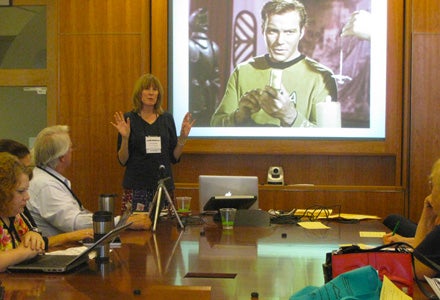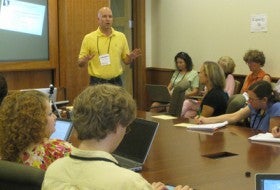COLTT kick-starts fall semester with latest in technology, education
As we gallop toward the return of students and the start of fall courses, the COLTT conference gave educators from near and far the tech ed tools they need to grow and improve their courses.
Earlier this month, more than 350 faculty, instructional designers, academic technologists, IT staff, instructors and graduate students converged at the ATLAS Building on the University of Colorado Boulder campus to explore and share the latest innovations in technology and education. Besides Colorado higher ed representatives, the 14th Colorado Learning and Teaching with Technology (COLTT) conference brought together attendees from both coasts representing the University of Pittsburgh, Roberts Wesleyan (Rochester), Kansas State University, California State University, California State University Channel Islands, the University of Calgary and the University of Wyoming.
“We had a competitive process for proposals that allowed us to offer a schedule packed with information-filled sessions that were well-attended,” said Jill Lester, COLTT conference coordinator at CU-Boulder.
The conference engaged participants in learning about teaching practices and technologies and challenged the way attendees think about both. Educators took part in presentations and hands-on workshops, networked and gathered effective practices to enhance the way they teach and learn in classrooms, online and in virtual environments.
Attendees agreed the conference made its mark.
“The COLTT conference allows Colorado faculty to share educational technology research findings and exchange just-in-time best practices," said Diane Sieber, associate professor and director of the Herbst Program of Humanities in the College of Engineering and Applied Science at CU-Boulder. "I also got to see demos of three new educational apps that I had not explored; I will try at least one of them next week when my new first-year course begins.”
Said Ellen Stevens, director of the Center for Faculty Development at CU Denver, “It is always fun to talk with people who care deeply about their students' learning. This year, I was impressed with the sessions both in the quality of the presentations and the variety of topics. I came away with some great ideas to share with colleagues.”
Storm Gloor, assistant professor of music and entertainment industry studies at CU Denver, said attending COLTT was an invaluable experience. "Among other things, it was a great time to learn and work hands-on with the latest teaching technology just prior to the new semester. As a presenter, I was honored to have the opportunity to contribute what I've learned from utilizing technology to improve engagement in the teaching process.”
- Gaming Education: Things I Have Learned in My Online Course So Far;
- Leveraging Game Psychology for Better Learning;
- Friends and Twits: Social Media and Education;
- Introduction to Digital Graphics;
- Adobe Photoshop Lightroom 3 and Photoshop CS 5;
- Quick and Easy Videos: Producing and Uploading Video Content.
Led by JJ Cohen and Helen Macfarlane from Anschutz Medical Campus, the ever-popular Café Pédagogique concluded the first day of the conference with lively discussion on teaching and learning. During the event people came together for food and refreshments to hear three informal presentations on educational topics, each led by someone with strong feeling for the subject. This year’s speakers included CU Denver's Gloor, CU-Boulder's Jacie Moriyama and the University of Denver's Joseph Labreque.
- Gloor floated the idea that technophobe professors should be dragged into the 21st century. The audience, most of whom already had dragged themselves, agreed.
- Moriyama discussed whether academic technology was a necessity or a distraction in the classroom; "both" was the consensus.
- Labreque , an ur-techie, asked, “Does your institution need a mobile app for that? Probably not.”
Each talk, which was limited by the rules to five minutes, was followed by about 20 minutes of questions and answers and general discussion. The Café Ped, the first of its kind and based on the Café Sci, was initiated for the COLTT conference in 2008 and has been held each year during the conference in Boulder. Last year, Macfarlane and Cohen started a monthly Café Ped at the Anschutz Medical Campus, which has been popular with staff, students and faculty (http://medschool.ucdenver.edu/cafeped).



